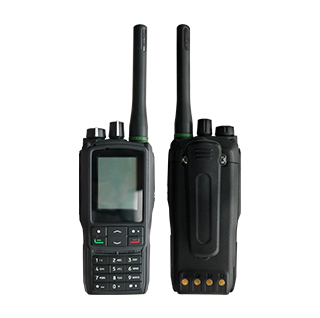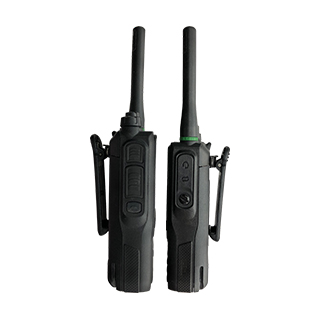Ad-hoc Network Digital Walkie-Talkie
The Ad-hoc Network Digital Walkie-Talkie is a next-generation communication solution built upon advanced self-organizing network (Ad-hoc) technology. Unlike traditional two-way radios that depend on repeaters or base stations, this device automatically forms a dynamic wireless mesh network among all units in range.
Each device functions as both a transceiver and relay node, extending communication coverage and ensuring reliable, real-time voice transmission even in environments without existing infrastructure.
The Ad-hoc Digital Walkie-Talkie is designed for emergency response, military coordination, field operations, security, and industrial applications, providing a stable, secure, and interference-free network that can automatically adapt to topology changes.
With digital audio processing, low latency transmission, and multi-hop networking, this device ensures high-quality communication where traditional radio networks fail — in tunnels, forests, mountains, and remote disaster zones.
The following table outlines the standard parameters of the Ad-hoc Network Digital Walkie-Talkie:
| Category | Specification Details |
|---|---|
| Model Name | ADHT-9000 (Ad-hoc Network Digital Walkie-Talkie) |
| Network Type | Self-forming wireless Ad-hoc mesh network |
| Frequency Range | 410–470 MHz (UHF) / 136–174 MHz (VHF) |
| Modulation | Digital QPSK / OFDM |
| Channel Bandwidth | 12.5 / 25 kHz selectable |
| Transmission Power | 5W / 10W adjustable |
| Communication Range | 3–5 km (single hop); expandable through multi-hop |
| Network Capacity | Up to 64 nodes per mesh network |
| Voice Codec | Digital AMBE+2™ |
| Data Transmission | Up to 64 kbps (voice + data) |
| Encryption | AES 256-bit / Dynamic key exchange |
| GPS / Positioning | GPS / BeiDou dual-mode supported |
| Display | 1.8-inch OLED display |
| Power Supply | 7.4V / 4000mAh Li-ion battery |
| Battery Life | 10–14 hours (continuous use) |
| Operating Temperature | -20°C to +60°C |
| Protection Grade | IP67 (waterproof and dustproof) |
| Dimensions | 135 mm × 60 mm × 40 mm |
| Weight | 380 g (with battery) |
| Compliance | CE, FCC, RoHS, ISO 9001 |
This configuration ensures stable digital communication, even under harsh environmental conditions where network signals or repeaters are unavailable.
The Ad-hoc Network Digital Walkie-Talkie is a versatile communication tool widely used across multiple industries and mission-critical fields.
Used by police, fire departments, and medical teams for field communication.
Supports multi-hop transmission to extend range during rescue operations.
Ensures communication continuity when cellular networks collapse during disasters.
Self-organizing network technology allows soldiers to communicate across multiple terrains without external infrastructure.
Supports encrypted communication and real-time GPS tracking.
Quick network formation and auto-routing enhance coordination efficiency.
Ideal for underground mines, tunnels, and large industrial complexes where traditional radio signals are obstructed.
The multi-hop mesh network maintains coverage even across multiple barriers.
Enables data transmission such as temperature monitoring, gas detection, or worker positioning.
Used in fleet management, railway maintenance, and port operations.
Provides instant, reliable communication between moving units and control centers.
Perfect for mountaineering, scientific research, and exploration where no network coverage exists.
Each radio automatically connects to the nearest device to ensure continuous signal relay.
Useful for stadiums, exhibitions, and concerts, providing seamless communication among staff.
The mesh network self-adjusts as users move across venues.


Unboxing: Confirm the package contains the radio, antenna, battery, charger, and manual.
Battery Installation: Slide and lock the battery securely onto the back panel.
Antenna Connection: Screw the antenna onto the radio’s antenna port until firmly seated.
Power On: Hold the power button for 3 seconds until the display lights up.
The Ad-hoc radio automatically searches for other nearby units when powered on.
Once detected, it forms a self-organized mesh network without manual configuration.
Each radio acts as a relay node, transmitting both voice and data.
The network topology continuously updates as users move.
Push-to-Talk (PTT): Press and hold to transmit voice; release to receive.
Group Calls: Assign devices into groups for team-based communication.
Private Calls: Select a specific ID for direct one-to-one transmission.
Emergency Mode: Double-press the SOS button to alert all nodes.
Enable GPS/BeiDou mode for automatic positioning.
Location data can be transmitted to command systems or mapping software.
Supports data sharing, such as sensor readings or text messages.
Charge via docking cradle or USB-C interface (approx. 4 hours full).
Avoid overcharging or exposure to direct sunlight.
Clean regularly using a dry cloth; never use chemical solvents.
Perform monthly firmware updates via the manufacturer’s software tool.
Do not operate the radio near explosive gases or flammable materials.
Keep the antenna at least 2.5 cm from the face when transmitting.
Always use certified accessories to ensure compliance and safety.
Answer:
An Ad-hoc network automatically forms communication links between radios without a base station or repeater. Each device acts as both transmitter and relay, ensuring extended coverage and dynamic connectivity.
Answer:
A single hop covers 3–5 km, and multiple devices can connect to extend range up to 20 km or more through multi-hop relaying.
Answer:
Yes. The device uses AES-256-bit encryption with dynamic key generation to prevent interception or unauthorized access.
Answer:
Absolutely. The Ad-hoc Digital Walkie-Talkie operates completely independent of cellular or Wi-Fi networks.
Answer:
A single mesh network supports up to 64 nodes, and multiple networks can be linked for larger deployments.
Answer:
Yes. Built-in GPS and BeiDou modules allow real-time positioning and automatic data sharing.
Answer:
Only through gateway or repeater bridges. It primarily supports digital protocols for enhanced clarity and encryption.
Answer:
Up to 14 hours of continuous communication or 72 hours in standby mode.
Answer:
With IP67 protection, it is waterproof, dustproof, and shock-resistant, suitable for extreme weather and industrial sites.
Answer:
Simply deploy additional radios within signal range. Each new device automatically integrates into the existing mesh and extends the coverage area.
No Infrastructure Required: Works without base stations, towers, or repeaters.
Self-Healing Capability: Automatically reroutes data if one node goes offline.
High Reliability: Maintains communication even when traditional systems fail.
Flexible Deployment: Ideal for both stationary and mobile environments.
High-Quality Digital Audio: Noise reduction and echo cancellation ensure clear voice.
Encryption Security: Prevents eavesdropping and unauthorized interception.
Scalability: Easily expand communication range by adding more nodes.
The Ad-hoc Network Digital Walkie-Talkie complies with global environmental protection standards:
RoHS Certified: Restriction of hazardous substances in components.
ISO 9001: Quality management certification ensures consistent performance.
IP67 Rating: Fully protected against dust ingress and temporary immersion in water.
Temperature Endurance: Operates from -20°C to +60°C without performance loss.
The rugged polycarbonate and aluminum alloy casing provides impact resistance, ensuring reliability in tough conditions such as construction, disaster response, or outdoor exploration.
To guarantee stable operation and long service life, follow this recommended maintenance cycle:
| Maintenance Item | Cycle | Description |
|---|---|---|
| Firmware update | Every 6 months | Update via official software |
| Battery replacement | Every 18–24 months | Replace if capacity decreases |
| Antenna inspection | Monthly | Check connection and wear |
| Cleaning | Monthly | Wipe surface and port areas |
| Function test | Weekly | Perform PTT, voice, and GPS checks |
Routine care ensures consistent signal quality, extends equipment lifespan, and prevents accidental downtime.
The Ad-hoc Network Digital Walkie-Talkie represents a new era in professional wireless communication.
Its self-organizing mesh technology, robust encryption, and flexible scalability make it indispensable for teams working in remote, dynamic, or high-risk environments.
From public safety and rescue operations to industrial projects and outdoor expeditions, this radio ensures real-time, stable, and secure communication without dependency on existing infrastructure.
By combining digital audio clarity, network autonomy, and military-grade durability, the Ad-hoc Network Digital Walkie-Talkie delivers a future-proof communication solution for organizations that value reliability, safety, and efficiency.
The walkie-talkie is a reliable two-way communication device widely used in personal, commercial, and industrial applications. With advanced design and user-friendly functions, it allows instant voice transmission without the need for a mobile network.
Instant Communication: Press-to-talk (PTT) functionality ensures fast voice transmission.
Durable Design: Built to withstand outdoor and industrial environments.
Long Battery Life: Optimized for extended operation in the field.
Compact and Portable: Lightweight design for easy carrying.
Clear Audio: Noise reduction technology provides stable sound quality.
| Specification | Details |
|---|---|
| Frequency Range | UHF / VHF options available |
| Communication Distance | Up to 3–10 km (depending on model) |
| Battery Capacity | 1500–3000 mAh rechargeable |
| Power Output | 1–5W adjustable |
| Operating Temperature | -20°C to +50°C |
| Dimensions | Compact handheld design |
With stable performance and reliable specifications, the walkie-talkie is an essential tool for users who require efficient and uninterrupted communication in different environments.
The Internet Radio delivers high performance by combining digital audio processing with internet-based communication. Unlike conventional radios limited by AM/FM frequencies, it ensures uninterrupted global connectivity through Wi-Fi or mobile networks.
High Audio Clarity: DSP technology reduces noise and enhances sound quality.
Low Latency: Fast signal transmission suitable for real-time communication.
Durability: Operates reliably under wide temperature and environmental conditions.
Battery Efficiency: Supports up to 12 hours of continuous use.
Flexible Connectivity: Compatible with Wi-Fi, 4G/5G, and Bluetooth.
The Internet Radio works by receiving digital data streams from online servers and converting them into high-quality audio. Its operation can be explained in four steps:
Network Connection – Establishes a link via Wi-Fi or mobile networks.
Data Reception – Retrieves online radio signals and streams.
Signal Processing – Converts compressed digital data into clear audio using DSP.
Audio Output – Plays through built-in speakers or connected headphones.
By integrating advanced networking and efficient processing, the Internet Radio ensures reliable, clear, and versatile performance. Its working principle guarantees stable connectivity and superior sound, making it a trusted device for both professional and personal use.
This website uses cookies to ensure you get the best experience on our website.